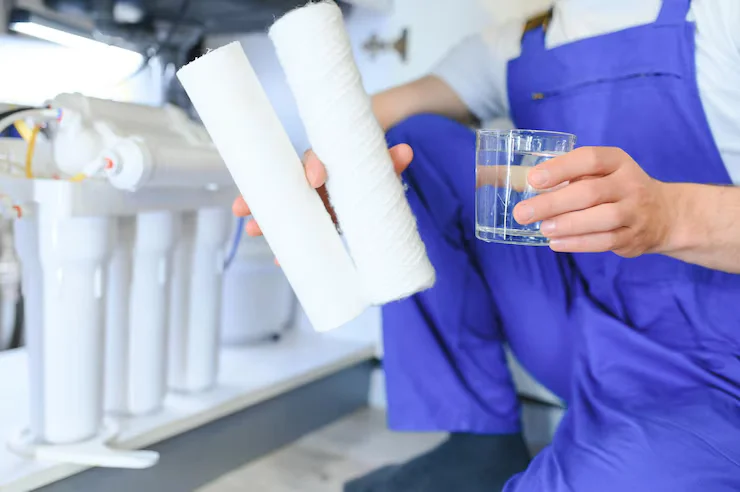The significance of water purity cannot be overstated in today’s health-conscious society. Water is the elixir of life, a basic necessity for sustaining health and well-being. Yet, many individuals are often oblivious to the quality of water they consume daily. One efficient way to ensure the purity of drinking water at the point of use is through the employment of a reverse osmosis water filter. This article delves into the intricacies of reverse osmosis (RO) water filtration, the technology behind it, and its pivotal role in providing pure hydration.
Understanding Reverse Osmosis Filtration
Reverse osmosis is a process where water is forced under pressure through a semipermeable membrane, effectively removing a vast majority of contaminants, including bacteria, viruses, salts, and chemicals. It is designed to purify water by eliminating those impurities that can contribute to health issues, taste alteration, and odour. RO systems come in various sizes and are used both in home and industrial settings.
The Mechanics of a RO System
The core of the reverse osmosis water filter is a synthetic semipermeable membrane with tiny pores that allow water molecules to pass but filter out larger molecules and impurities. The incoming water pressure pushes the water through the RO membrane and collects the purified water on the other side. The contaminants are flushed away in a separate stream, often referred to as brine or wastewater.
Components of a Reverse Osmosis Water Filter
An RO water filter comprises several elements that collectively work to ensure the effectiveness of the filtration process. Key components include pre-filters, the RO membrane itself, storage tanks, and faucet attachments. The pre-filters remove sediment, chlorine, and other contaminants that could clog or damage the membrane. The purified water is then stored in a tank until needed, and a dedicated faucet usually dispenses the clean water away from potential contamination from the main plumbing system.
Advantages of Using an RO Water Filter
One of the predominant perks of using a reverse osmosis water filter is the significant reduction of harmful contaminants. These sophisticated systems can purify water to a degree that is unattainable by most other water filtration methods. They effectively remove microorganisms, heavy metals, and dissolved solids, making the water safe for consumption. Moreover, RO systems improve the taste and odour of the water by eliminating the substances that cause unpleasant sensory experiences.
Purity Meets Practicality: Installation and Maintenance
When it comes to installing an RO system, professional installation is generally recommended to ensure the system functions properly. These systems have specific pressure requirements and need to be connected accurately to both the water inlet and drain. Additionally, routine maintenance is crucial for keeping the system operational. This usually involves replacing pre-filters and the RO membrane at manufacturer-recommended intervals to prevent reduced water quality as well as system inefficiencies.
Environmental Considerations and Efficiency
While reverse osmosis filters excel in water purification, they are sometimes criticised for the amount of wastewater they generate during the filtration process. However, advanced RO systems have been engineered to be more water-efficient, thus reducing the volume of wastewater. Furthermore, the elimination of the need for bottled water by using an RO system substantially lowers the environmental impact associated with plastic waste.
Health Benefits of RO Filtered Water
The use of a reverse osmosis water filter can have a positive impact on health. Pure water free of contaminants facilitates proper hydration, which is vital for all bodily functions. Drinking clean water can help prevent diseases caused by waterborne pathogens and protect against the ingestion of harmful chemicals and metals commonly found in unfiltered tap water.
Economic Aspects of Water Filtration
Despite the upfront cost associated with acquiring and installing an RO system, there are long-term economic benefits to consider. With a reverse osmosis filter, the need for purchasing bottled water diminishes, leading to substantial savings over time. Additionally, the longevity of these systems, when properly maintained, means that they are a wise investment for years to come.
Differentiating Among RO Systems
Not all reverse osmosis systems are created equal, and various models offer different levels of purification and features. Some systems are equipped with additional stages of filtration, such as UV light or carbon filters, to further enhance water quality. It is important to research and compare various systems to find one that best suits individual water purity needs and budget considerations.
Conclusion: The Priority of Pure Water
Incorporating a reverse osmosis water filter into one’s household water purification regimen is a proactive step towards ensuring the health and safety of oneself and loved ones. It not only provides peace of mind but also contributes to the overall goal of a more environmentally responsible and sustainable lifestyle. Recognising the indispensable role of pure water is the first step. Selecting a reliable RO water filter system is the journey towards securing the essence of pure hydration.
As society progresses and environmental factors continue to influence the quality of our natural resources, the significance of having access to pure water cannot be understated. A reverse osmosis water filter stands as a testament to modern technological ingenuity, bridging the gap between necessity and health for current and future generations seeking the essence of life in its most pristine form: water of pure hydration.







